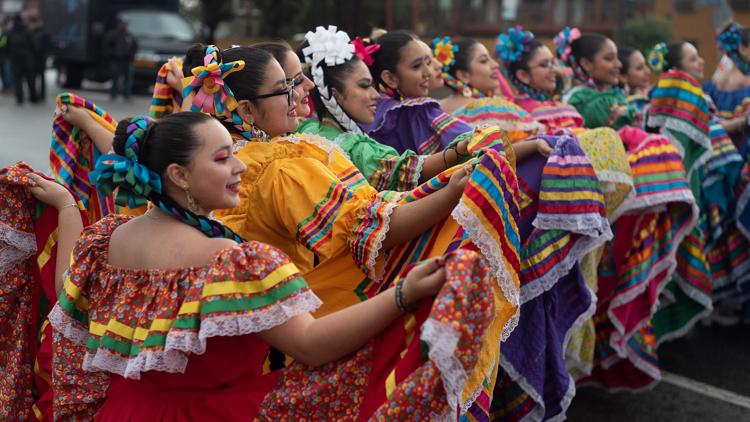What began as Hispanic Heritage Week in 1968 transformed into a 30-day period of celebrating Hispanic and Latino communities.


WASHINGTON — Hispanic Heritage Month officially kicked off its celebrations on Sunday, Sept. 15, and lasts through Oct. 15 as a way to highlight the histories, contributions and communities of those with Hispanic or Latino roots.
The monthlong celebration each year showcases the diversity and culture of Hispanic people, the country's fastest-growing racial or ethnic minority, according to the U.S. census. The group includes those with ancestry from Spain, Mexico, the Caribbean and Central and South America.
Hispanic Heritage Month comes at a time in the U.S. where there are more than 65 million people who identify as ethnically Hispanic, according to the latest census estimates.
Why do we celebrate Hispanic Heritage Month?
For many Latin American countries, Sept. 15 marks the anniversary of their independence from Spain. The list includes Costa Rica, El Salvador, Guatemala and Nicaragua.
Throughout the rest of the month other countries, including Mexico and Chile, also have their own independence day celebrations.
Columbus Day, celebrated on Oct. 12, falls within this 30-day window. But rather than celebrating Columbus, Hispanic and Latino countries celebrate what is known as "Día de la Raza,” which translates to "Day of the Race." This holiday is dedicated to recognizing the cultural fusion of European and indigenous heritage in Latin America.
"Día de la Raza" is celebrated in Argentina, Chile, Costa Rica, Ecuador, Honduras, Mexico, Uruguay and Venezuela.
When was Hispanic Heritage Month first celebrated?
What began as Hispanic Heritage Week in 1968 under President Lyndon B. Johnson, transformed into a 30-day period of celebrating Hispanic communities and achievements.
In 1987, California Rep. Esteban Torres proposed a bill to expand the week-long celebration to a whole month.
"We want the public to know that we share a legacy with the rest of the country, a legacy that includes artists, writers, Olympic champions, and leaders in business, government, cinema, and science,” Torres said in his remarks about the bill.
Though his bill died in committee, Illinois Sen. Paul Simon filed a similar bill, which President Ronald Reagan signed into law in August 1988.
In 1989, under President George H.W. Bush, America celebrated its first national Hispanic Heritage Month.
How is Hispanic Heritage Month celebrated?
Hispanic Heritage Month encompasses the celebrations of several Latin American, Central American and Caribbean countries, which means celebrations differ. However, the key goal is to celebrate and shine light on the communities and their achievements.
The Smithsonian National Museum of the American Latino, among other museums, host several free events honoring leaders of Hispanic and Latino communities.
The Library of Congress hosts a website on National Hispanic Heritage Month, which offers event highlights, historical archives and other resources for learning more about the celebratory month.
The Associated Press contributed to this story.
.png)









 English (US) ·
English (US) ·